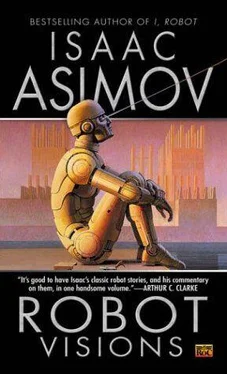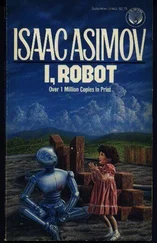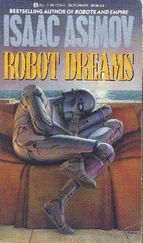Isaac Asimov - Robot Visions
Здесь есть возможность читать онлайн «Isaac Asimov - Robot Visions» весь текст электронной книги совершенно бесплатно (целиком полную версию без сокращений). В некоторых случаях можно слушать аудио, скачать через торрент в формате fb2 и присутствует краткое содержание. Жанр: Фантастика и фэнтези, на английском языке. Описание произведения, (предисловие) а так же отзывы посетителей доступны на портале библиотеки ЛибКат.
- Название:Robot Visions
- Автор:
- Жанр:
- Год:неизвестен
- ISBN:нет данных
- Рейтинг книги:5 / 5. Голосов: 1
-
Избранное:Добавить в избранное
- Отзывы:
-
Ваша оценка:
- 100
- 1
- 2
- 3
- 4
- 5
Robot Visions: краткое содержание, описание и аннотация
Предлагаем к чтению аннотацию, описание, краткое содержание или предисловие (зависит от того, что написал сам автор книги «Robot Visions»). Если вы не нашли необходимую информацию о книге — напишите в комментариях, мы постараемся отыскать её.
Robot Visions — читать онлайн бесплатно полную книгу (весь текст) целиком
Ниже представлен текст книги, разбитый по страницам. Система сохранения места последней прочитанной страницы, позволяет с удобством читать онлайн бесплатно книгу «Robot Visions», без необходимости каждый раз заново искать на чём Вы остановились. Поставьте закладку, и сможете в любой момент перейти на страницу, на которой закончили чтение.
Интервал:
Закладка:
But now let us try to imagine something that is neither organism nor robot, but a combination of the two. Perhaps we can think of it as an organism-robot or “orbot.” That would clearly be a poor name, for it is only “robot” with the first two letters transposed. To say “orgabot,” instead, is to be stuck with a rather ugly word.
We might call it a robot-organism, or a “robotanism,” which, again, is ugly or “roborg.” To my ears, “roborg” doesn’t sound bad, but we can’t have that. Something else has arisen.
The science of computers was given the name “cybernetics” by Norbert Weiner a generation ago, so that if we consider something that is part robot and part organism and remember that a robot is cybernetic in nature, we might think of the mixture as a “cybernetic organism,” or a “cyborg.” In fact, that is the name that has stuck and is used.
To see what a cyborg might be, let’s try starting with a human organism and moving toward a robot; and when we are quite done with that, let’s start with a robot and move toward a human being.
To move from a human organism toward a robot, we must begin replacing portions of the human organism with robotic parts. We already do that in some ways. For instance, a good percentage of the original material of my teeth is now metallic, and metal is, of course, the robotic substance par excellence.
The replacements don’t have to be metallic, of course. Some parts of my teeth are now ceramic in nature, and can’t be told at a glance from the natural dentine. Still, even though dentine is ceramic in appearance and even, to an extent, in chemical structure, it was originally laid down by living material and bears the marks of its origin. The ceramic that has replaced the dentine shows no trace of life, now or ever.
We can go further. My breastbone, which had to be split longitudinally in an operation a few years back is now held together by metallic staples, which have remained in place ever since. My sister-in-law has an artificial hip-joint replacement. There are people who have artificial arms or legs and such non-living limbs are being designed, as time passes on, to be ever more complex and useful. There are people who have lived for days and even months with artificial hearts, and many more people who live for years with pacemakers.
We can imagine, little by little, this part and that part of the human being replaced by inorganic materials and engineering devices. Is there any part which we would find difficult to replace, even in imagination?
I don’t think anyone would hesitate there. Replace every part of the human being but one-the limbs, the heart, the liver, the skeleton, and so on-and the product would remain human. It would be a human being with artificial parts, but it would be a human being.
But what about the brain?
Surely, if there is one thing that makes us human it is the brain. If there is one thing that makes us a human individual, it is the intensely complex makeup, the emotions, the learning, the memory content of our particular brain. You can’t simply replace a brain with a thinking device off some factory shelf. You have to put in something that incorporates all that a natural brain has learned, that possesses all its memory, and that mimics its exact pattern of working.
An artificial limb might not work exactly like a natural one, but might still serve the purpose. The same might be true of an artificial lung, kidney, or liver. An artificial brain, however, must be the precise replica of the brain it replaces, or the human being in question is no longer the same human being.
It is the brain, then, that is the sticking point in going from human organism to robot.
And the reverse?
In “The Bicentennial Man,” I described the passage of my robot-hero, Andrew Martin, from robot to man. Little by little, he had himself changed, till his every visible part was human in appearance. He displayed an intelligence that was increasingly equivalent (or even superior) to that of a man. He was an artist, a historian, a scientist, an administrator. He forced the passage of laws guaranteeing robotic rights, and achieved respect and admiration in the fullest degree.
Yet at no point could he make himself accepted as a man. The sticking point, here, too, was his robotic brain. He found that he had to deal with that before the final hurdle could be overcome.
Therefore, we come down to the dichotomy, body and brain. The ultimate cyborgs are those in which the body and brain don’t match. That means we can have two classes of complete cyborgs:
a) a robotic brain in a human body, or
b) a human brain in a robotic body.
We can take it for granted that in estimating the worth of a human being (or a robot, for that matter) we judge first by superficial appearance.
I can very easily imagine a man seeing a woman of superlative beauty and gazing in awe and wonder at the sight. “What a beautiful woman,” he will say, or think, and he could easily imagine himself in love with her on the spot. In romances, I believe that happens as a matter of routine. And, of course, a woman seeing a man of superlative beauty is surely likely to react in precisely the same way.
If you fall in love with a striking beauty, you are scarcely likely to spend much time asking if she (or he, of course) has any brains, or possesses a good character, or has good judgment or kindness or warmth. If you find out eventually that good looks are the person’s only redeeming quality, you are liable to make excuses and continue to be guided, for a time at least, by the conditioned reflex of erotic response. Eventually, of course, you will tire of good looks without content, but who knows how long that will take?
On the other hand, a person with a large number of good qualities who happened to be distinctly plain might not be likely to entangle you in the first place unless you were intelligent enough to see those good qualities so that you might settle down to a lifetime of happiness.
What I am saying, then, is that a cyborg with a robotic brain in a human body is going to be accepted by most, if not all, people as a human being; while a cyborg with a human brain in a robotic body is going to be accepted by most, if not all, people as a robot. You are, after all-at least to most people-what you seem to be.
These two diametrically opposed cyborgs will not, however, pose a problem to human beings to the same degree.
Consider the robotic brain in the human body and ask why the transfer should be made. A robotic brain is better off in a robotic body since a human body is far the more fragile of the two. You might have a young and stalwart human body in which the brain has been damaged by trauma and disease, and you might think, “Why waste that magnificent human body? Let’s put a robotic brain in it so that it can live out its life.”
If you were to do that, the human being that resulted would not be the original. It would be a different individual human being. You would not be conserving an individual but merely a specific mindless body. And a human body, however fine, is (without the brain that goes with it) a cheap thing. Every day, half a million new bodies come into being. There is no need to save anyone of them if the brain is done.
On the other hand, what about a human brain in a robotic body? A human brain doesn’t last forever, but it can last up to ninety years without falling into total uselessness. It is not at all unknown to have a ninety-year-old who is still sharp, and capable of rational and worthwhile thought. And yet we also know that many a superlative mind has vanished after twenty or thirty years because the body that housed it (and was worthless in the absence of the mind) had become uninhabitable through trauma or disease. There would be a strong impulse then to transfer a perfectly good (even superior) brain into a robotic body to give it additional decades of useful life.
Читать дальшеИнтервал:
Закладка:
Похожие книги на «Robot Visions»
Представляем Вашему вниманию похожие книги на «Robot Visions» списком для выбора. Мы отобрали схожую по названию и смыслу литературу в надежде предоставить читателям больше вариантов отыскать новые, интересные, ещё непрочитанные произведения.
Обсуждение, отзывы о книге «Robot Visions» и просто собственные мнения читателей. Оставьте ваши комментарии, напишите, что Вы думаете о произведении, его смысле или главных героях. Укажите что конкретно понравилось, а что нет, и почему Вы так считаете.








